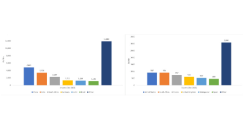Africa’s Stalled Growth: Facing a ‘Lost Decade’
Share

Africa is bracing for a period of economic stagnation, as recent reports from the World Bank and the African Development Bank (AfDB) forecast a slowdown in economic growth across the continent. These forecasts signal a troubling future for Africa, marked by an inability to generate necessary jobs, rising conflicts and instability, and an ongoing struggle against the backdrop of global economic uncertainties.
The World Bank’s forecast, released on Oct. 4, 2023, paints a grim picture for the current year. Growth is expected to fall to 2.5%, a significant drop from the 3.6% seen last year. This deceleration is largely attributed to a slowdown in major economies, climate shocks, and the unpredictable nature of the global economy. Countries like Nigeria, Angola, and South Africa are expected to see growth rates of 2.9%, 1.3%, and a mere 0.5% respectively. South Africa’s struggles are compounded by persistent power outages and infrastructure bottlenecks, severely hampering its export capabilities.
A particularly alarming trend is the stagnation of GDP per capita, which hasn’t increased since 2015. The World Bank projects a growth rate of just 0.1% per year from 2015 to 2025, raising fears of a “lost decade” for sub-Saharan Africa. Andrew Dabalen, the World Bank’s chief economist for Africa, emphasized the dire implications of this low growth, including slower poverty reduction and insufficient job creation in a region where over 12 million people enter the job market annually. The current growth rate is barely sufficient to generate 3 million formal jobs per year.
Instability, political fragility, and rising conflicts are the primary culprits behind this economic deceleration, with some countries, like Sudan, facing severe recession due to prolonged conflicts. Sudan’s economy is expected to contract by 12% this year. Public debt is another looming concern, with over 20 countries at high risk of over-indebtedness, including Egypt and Tunisia, which are either already receiving IMF aid or in dire need of it.
The AfDB’s report mirrors these concerns, revising its macroeconomic forecasts for 2023 and 2024 downwards. Growth is now projected at 3.4% for this year and 3.8% for the next, a decrease from earlier forecasts of 4.0% and 4.3%. The AfDB cites the long-term impacts of the Covid-19 pandemic, geopolitical tensions, climate shocks, and the global economic slowdown as key factors. Additionally, African governments’ limited fiscal space to respond to these shocks exacerbates the situation.
Kevin Urama, AfDB’s chief economist, underscores the influence of the challenging global economic environment and various shocks on Africa’s macroeconomic performance. Inflation remains a persistent threat, jeopardizing the gains made in the post-pandemic period.
In the short term, the AfDB advises African countries to adopt restrictive monetary policies to curb inflation, alongside fiscal policies that encourage economic diversification and address supply constraints. For the medium and long term, the focus shifts to investments in human capital and infrastructure to boost productivity, stimulate economic growth, and promote inclusive and sustainable development.
Despite some global relief from inflation, Africa continues to struggle with it, with average inflation expected to hit 18.5% last year and 17.1% in 2024. This inflation is driven by supply disruptions, import inflation, and budget issues in several African countries.
In conclusion, the risk of increased poverty due to diminishing purchasing power is a major concern, compounded by the global economic slowdown impacting the demand for African exports. This is especially true for countries dependent on the Chinese market for raw material exports. What we should therefore bear in mind: these reports highlight a confluence of internal and external challenges facing Africa. Policymakers must urgently address these issues to avert a “lost decade” and try to ensure a future of growth and prosperity for our continent.

















